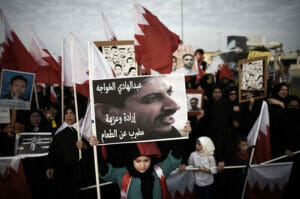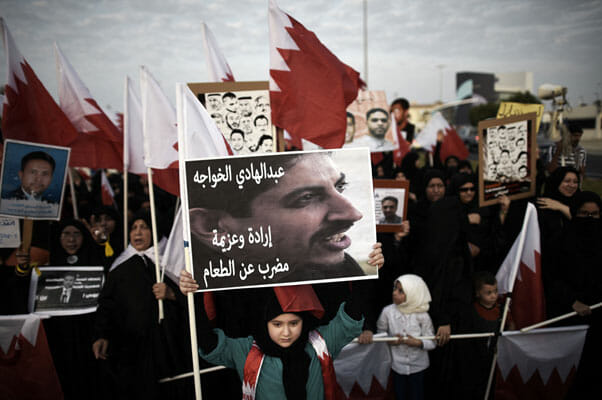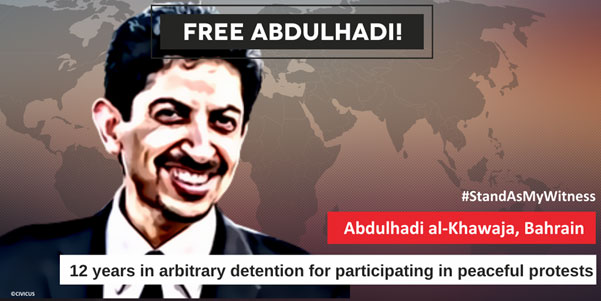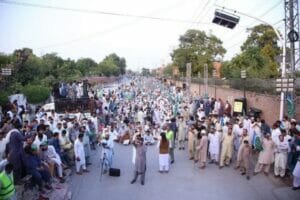
Asia-Pacific, Civil Society, Food Security and Nutrition, Headlines, Humanitarian Emergencies, Poverty & SDGs, TerraViva United Nations, Trade & Investment
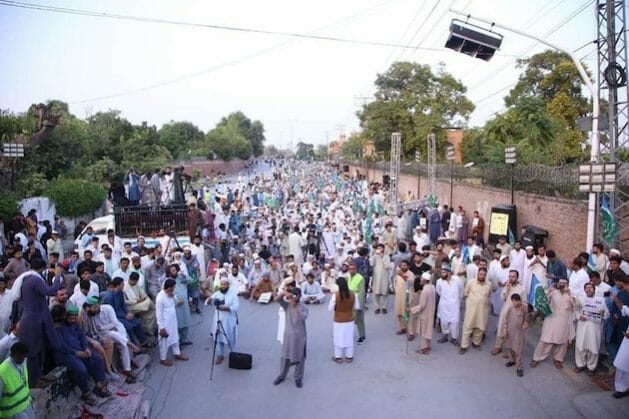
Jamaat-i-Islami party stage protest in Peshawar against price-hikes. Credit: Ashfaq Yusufzai/IPS
– “We are under extreme stress about skyrocketing prices of essential edible commodities and the cost of gas and electricity. The situation is becoming worse because every day. We must pay more for wheat flour, sugar, tea, milk, oil, etc.,” Azizullah Khan, a civil servant, says.
Khan draws a monthly salary of 30,000 rupees (USD100), but the cost of living is increasing daily, making it hard for his family of eight to survive.
The electricity bill for August was 20,000 rupees (USD67), and two-thirds of his salary went into paying that, while the remaining 10,000 rupees (USD33) is meant to pay for gas and other family expenses, which, he says, is next to impossible.
“Now, we are seriously thinking of selling the small house we inherited from our parents because we have to repay loans to the shopkeepers and pay the school fees of three children,” says Khan, 30. He lives on the outskirts of Peshawar, the provincial capital of Khyber Pakhtunkhwa, one of Pakistan’s four provinces.
Pakistan’s leading economy and business analyst, Khurram Hussain, told IPS that the country has been seeing relentless and unending pressure on the exchange rate and price levels for more than two and a half years.
“The present bout of exchange rate volatility began in May 2021 and has continued unabated since then,” Hussain says. The dollar had from around 150 rupees to the dollar to about 300 to the dollar, he says.
Quoted in Dawn, a newspaper in Pakistan, he noted: “It took ten years for the dollar to double in value from 75 to 150 rupees, from 2008 till 2019. It took less than two and a half years to double again from May 2021 till today.
At the same time, inflation, as measured by the Consumer Price Index, started to skyrocket a few months after May 2021 and has risen relentlessly until now, with a few interruptions.
Muhammad Raees, 28, a daily wager, is severely hit by the cost of living.
“One year back, the price of 20 kg wheat four was Rs1300, which has now increased to Rs3000. I don’t find work every day because the construction activities have nosedived due to cement, iron, marble, and tile prices, and most of the contractors have stopped work,” Raees, a father of two, says.
“Many times, I have thought of committing suicide, but then I think of my children and wife,” he says.
At least ten people have committed suicide in the past two months.
“They were unable to pay electricity bills. Now, the government is mulling about jacking up the gas price by 50 percent. The poor population is the worst hit,” he says.
Javid Shah, a vegetable seller in Nowshera city adjacent to Peshawar, is fed up with life. “Cost of transportation has increased, and so the prices of vegetables and, as a result, sales have declined. Many who bought 1 kg of tomatoes, lady fingers, and potatoes daily are now taking half a kg,” he says. “I have to discard rotten vegetables daily for lack of sales.”
Akram Ali, a fruit seller in a tiny shop, also constantly complains of high inflation and devaluation of rupees. Ali says his business has reached a standstill as people no longer buy fruits due to high prices.
“As a result, I am going to close shop and start the business in a hand pushcart to save on rent.”
“My two sons are going to school, but the last one and half years have been tough, and I cannot pay their fees. Both have quit schools and sit at home,” he complained.
Saleem Ahmed, a local economist, tells IPS that pulses, considered poor men’s diet, are so expensive they are out of reach of many.
“All pulses are imported in dollars, so their prices have increased. The people are struck by inflation, and they cannot buy items, like pulses, which used to be cheap,” he said.
Prices were stable until former Prime Minister Imran Khan was removed in April 2022 in a no-confidence vote at the National Assembly.
“People have been running from pillar to post for two square meals. As if inflation wasn’t enough, huge smuggling of sugar, wheat flour, pulses, oil, etc. to neighboring Afghanistan have hammered the last nail in the coffin of the poverty-stricken masses,” he said.
Ahmed says the government is taking loans from the IMF, the World Bank, and other lenders with high interest rates, impacting the cost of living.
In such a scenario, Afghan refugees living in Pakistan are jubilant over the rising Afghan economy under the Taliban, and many are weighing options to return to their country.
“In Pakistan, the US dollar is equal to 300 rupees while it is traded for 75 Afghani back home,” Muhammad Mustafa, an Afghan with a sanitary business in Peshawar, says.
Mustafa says he had sent his elder son to Kabul to search for the rented shop so he could shift his business there.
“All my family live in Kabul, and we want to be there. The time is ripe for us to shift (back) there,” he says.
Petrol is being sold at 312 rupees (USD1.5) per liter in Pakistan, while its rate was 80 Afghani (USD1.02) in Kabul.
IPS – UN Bureau, IPS UN Bureau Report,

